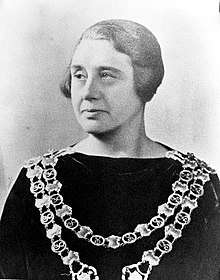Dorothy Thurtle
Dorothy Thurtle (née Lansbury; 15 November 1890 – 28 February 1973) was a British women's right activist, a campaigner for contraceptive and abortion rights, and a Labour Party politician.[1]

Early life
She was the sixth child of the eight daughters and four sons of George Lansbury, politician and social reformer, and Labour Party leader from 1932 to 1935, and his wife Elizabeth Jane Lansbury (née Brine).[1]
Career
She was 16 when she became a member of the Independent Labour Party (ILP).[1] She started work as a clerk and accountant, and very soon joined the National Union of Clerks.[1] She joined the Women's Freedom League and the Women's Labour League, but was unhappy with the militant tactics employed by the suffragette movement, and this led to tensions in the family, especially with more militant members including her brother William Lansbury who went to prison in 1913 for breaking windows in support of the Women's Social and Political Union.[1]
In 1924, Thurtle and her husband founded the Workers' Birth Control Group.[1]
Thurtle was the general secretary of Shoreditch Trades Council and Labour Party, and in 1925, was elected to Shoreditch Borough Council, later becoming mayor in 1936.[1] From 1946, she served a term as a member of the London County Council, representing Shoreditch.[2]
Throughout her career, Thurtle was a tireless advocate for working class women having free access to information on abortion, pressing the Labour Party on this, saying it made nonsense of their supposed commitment to sexual equality.[1]
In 1936, Thurtle became one of the earliest members of the Abortion Law Reform Association (ALRA), and served as a vice-president until her retirement in 1962.[1]
Thurtle's "greatest contribution to the cause of abortion rights" was as a member of the official interdepartmental committee on abortion, which sat from 1937 to 1939, under the chairmanship of Sir Norman Birkett. She made sure that all the evidence was considered, but did not agree with the majority view, and issued her own minority report, based on the fundamental view that abortion was not riskier than childbirth.[1][3]
Personal life
In 1912, she married Ernest Thurtle (later MP for Shoreditch).[1] They had two children, a son, Peter, and a daughter, Helen.[1]
Legacy
London's Shoreditch Park contains a memorial garden in her name, laid out in about 1970, and close to the Pitfield Street/Mintern Street entrance.[4]
References
- "Dorothy Thurtle". www.oxforddnb.com. Retrieved 17 November 2017.
- "The New L.C.C. Labour Gains In A Low Poll". The Times. 9 March 1946. p. 2.
- Barbara Brookes (12 December 2012). Abortion in England 1900-1967. Routledge. pp. 125–127. ISBN 978-1-136-24873-3. Retrieved 17 November 2017.
- "London Gardens Online". www.londongardensonline.org.uk. Retrieved 17 November 2017.